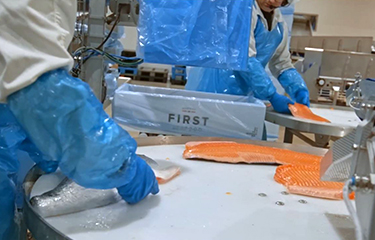First Seafood has opened a new salmon-processing plant in Kongsvinger, Norway, and has announced its plans to build another facility in Bergen.
The Oslo, Norway-based processor and exporter, which was acquired by Insula in 2016, confirmed its move on LinkedIn, saying it planned to open the facility in Q1 2024.
“Now it is official and we are happy to inform that Insula AS and First Seafood will establish a new salmon filet facility in Bergen,” it said.
The company, which specializes in custom-processed fresh and frozen salmon from Norway, will convert a facility previously used by Insula Produksjon for the production of fishcakes, according to a press release.
“We see a significant increase in demand in the export market for salmon fillet products and this factory will form part of an already established structure in First Seafood for the purchase, production, and sale of salmon products,” First Seafood Managing Director Andreas Sundnes said. “Together with our existing factory in Kongsvinger, the new factory in Bergen will give us a capacity of up to 30,000 MT of salmon products a year.”
First Seafood Chief Commercial Officer Roy Olsen said an expansion to Bergen made good sense for the company.
“The choice to establish production in Bergen is also based on good access to seafood expertise in the region, as well as great access to raw material from a number of players with farming in Western Norway,” he said.
First Seafood’s Kongsvinger factory opened this summer, and is equipped with the latest technology from BAADER. The expansion will “strengthen [our] sales and operations organization to be able to serve markets in Asia, Europe, and the U.S.A.,” the company said.
“We feel that our plans have been well received by players in the industry and we are sure that in the future we can have a higher degree of processing in Norway,” Olsen said.
The Bergen expansion project will be overseen by Insula Salmon Business Development Director Edgar Heitmann. He said First Seafood will benefit from the larger company’s experience in these types of projects, as it has with sharing products and services with Insula’s umbrella of holdings, which includes Conchilia, Fiskcentralen, Frøya Salmon, Insula Produksjon, Keco Logistikk, Lofotprodukt, Maritim Food, Sjøfrisk Norge, Båtsfjordbruket, Nordic Group, Tobø Fisk, and Vardøbruket.
Insula, which named Amund Fjortoft as CEO in May 2023, is itself owned by Kverva, which is owned by Norwegian multimillionaire Gustav Witzøe. Insula recorded NOK 6.8 billion (USD 617.8 million, EUR 588.1 million) in revenue in 2022, up from NOK 6.2 billion (USD 563.3 million, EUR 536.2 million) in 2021. Its earnings before interest, taxes, depreciation, and amortization (EBITDA) fell to NOK 61 million (USD 5.5 million, EUR 5.3 million), down from NOK 163 million (USD 14.8 million, EUR 14.1 million) in 2021.
Facing higher raw material prices and declining sales, the company made several changes to streamline its operations in 2022. Its Danish Insula Hanstholm fish-processing facility Insula Hanstholm was closed and its operation was subsequently merged with Insula Hvide Sande, and in Sweden, it closed its loss-making fresh fish outlet Fiskeriet at Årsta and Marenor’s facility in Varberg. Additionally, Insula Finland shut down its raw material trading business in October, according to its annual report.
“All were necessary actions that have already helped improve the various business area’s profit margins,” the company said.
Photo courtesy of First Seafood







